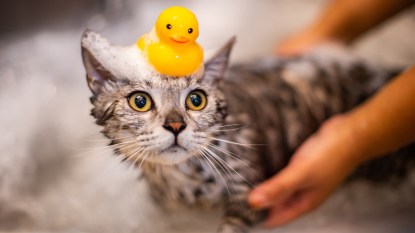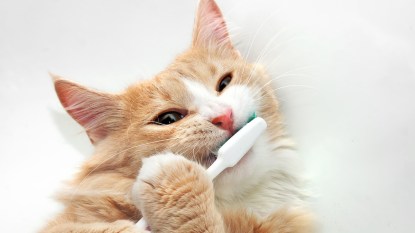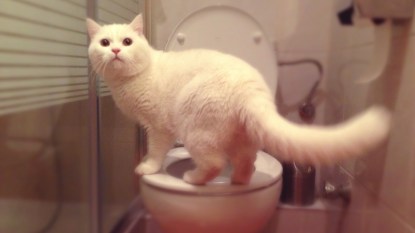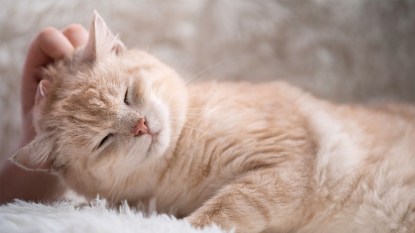4 Reasons Cats Bite — And How to Get Yours to Stop
Hint: You may be petting him the wrong way
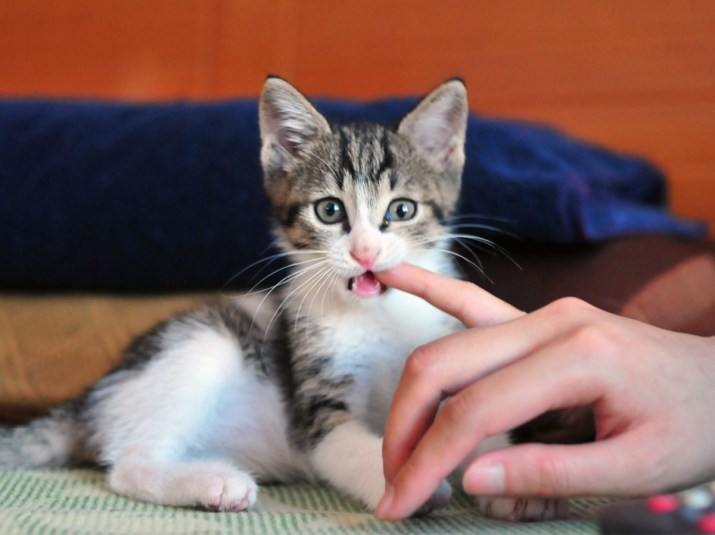
Ouch! No cat owner likes getting bitten, that’s for sure. But if your kitty won’t stop nipping you, you’ll be happy to know there are ways to get him to stop this annoying (and painful!) habit. We asked two renowned experts, cat behavior consultants Mikel Delgado, PhD and Pam Johnson-Bennett, author of Think Like a Cat, about how to stop a cat from biting.
The first step? Figuring out what’s causing your cat to act out so you can address the behavior effectively. “You don’t want to just label a cat as a biter because a cat is biting in a specific circumstance,” explains Johnson-Bennett. “Is the cat biting when you pick him up because he’s in pain? Is the cat biting because you’re not reading body language signals? Whatever it is, you have to identify what the cause is so that you can set the situation up differently.” (Speaking of behavior, click through to see why your cat sticks her tongue out at you.)
Here, four common reasons cats bite:
You’re touching your cat too much
“Cats are masters of communication and they very often have given us a lot of body language signals to let us know that they no longer are enjoying the petting or that they don’t really want our interaction,” shares Johnson-Bennett. Some signals to look for include turning their head away, no longer purring, shifting their body weight or thumping their tail. These are all signs they are no longer enjoying the physical touch. (Click through to see what it means when your cat lifts its butt in the air during petting time.)
Delgado adds that cats can get very irritated if you pet them too much or if you hold them when they don’t want to be held. They can also get annoyed if you pet a part of their bodies that they don’t want touched, such as their bellies. This type of frustration on the cat’s part can lead to him or her biting you in response.
“My first line of advice is back off and let the cat dictate handling a little bit more,” says Mikel. “A lot of us love cats. Cats are soft, they’re cute, we want to pet them as much as possible. But sometimes it’s really about the human being a little more hands-off.”
Your cat needs more play time
We might not always realize it, but cats can be very attracted to our simplest motions, such as the movement of our ankles as we walk around the house. Delgado says this can lead to a playful and high-energy cat chasing us around and partaking in some unexpected biting and scratching.
“That cat probably needs a lot more playtime,” Delgado says. “They might even need another companion cat.” If you’re not ready to add a second cat to your family, try to make sure your kitty is getting plenty of exercise.
If that’s the case, try sneaking easy exercise into her everyday routine to get her moving. For example, instead of pouring her food into her bowl, try wrapping a portion of her kibble in one or two clean washcloths, letting her sniff the fabric, then hiding the washcloths in different places around the house. As your cat searches for her food, she’ll get some much-needed exercise!
Your cat isn’t getting the proper type of play
It’s not secret that rambunctious kittens can think everything is a play thing — and that can lead to trouble down the road if we use ourselves as the entertainment.
“For the most part, what I see in my consultations is cat parents have used their hands as toys,” says Johnson-Bennett. “When the cat is a kitten and you’re rough housing with the kitten, it doesn’t hurt so much. But when the cat becomes an adult with adult teeth, it hurts!”
To avoid this painful behavior, try not to dangle fuzzy mice, balls and other small toys next to your kitty, which could put your arms in harm’s way when she tries to “capture” the item. Instead, choose longer toys like a fishing pole to enjoy interactive play. “You’ll put a safe distance between the cat’s teeth and your hand so the cat can do what cats do — and that is when they play, it’s very much like hunting,” she adds.
Something is wrong with your cat’s environment
If your cat seems fearful and defensive when biting, that’s a sign of a serious environmental issue. Delgado says this can stem from other animals or humans in the house or even how home is actually set up — especially if there is a lack of places where the cat can have privacy.
If this is the case, it’s important to address the behavior with your vet. Since an environmental issue will likely be a very specific one, you can work together to try to customize your home to fit your pet’s needs. “A defensive cat is one that is going to protect themselves, whereas a cat who’s more playfully aggressive is just expressing natural predatory behavior,” explains Delgado.
But no matter why your cat bites you, it’s important to always keep your cool after it happens. “Remain calm and gently push your hand toward the cat because that confuses them and they will release their grasp,” says Johnson-Bennett. “Once they release their grasp you ignore them for a second.”
According to both experts, a harsh punishment or an adverse reaction from you might cause your cat to bite even harder the next time and make the problem worse. Instead, try simply leaving the room, closing the door behind you.
For a cat who took it too far while playing, you want to nix the attention to send your message. “If he was playing and he was biting you, you want him to know all the fun stops because he bit,” explains Johnson-Bennett. “Then your job is to redirect to an appropriate toy if the cat was biting because he just got so carried away during play time.”





